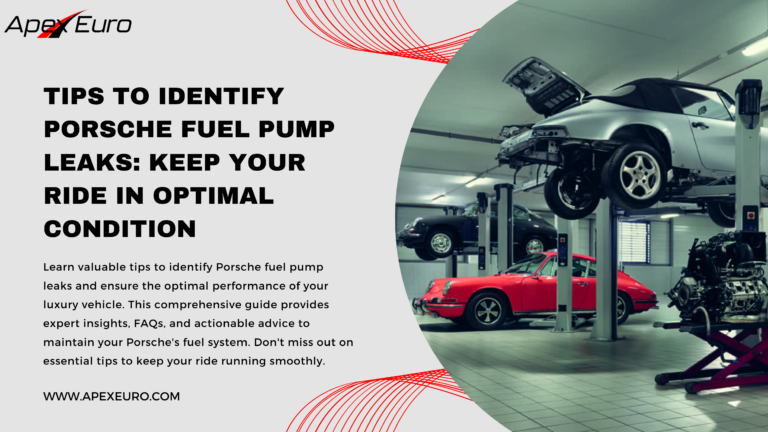As a proud owner of a Porsche, you understand the importance of regular maintenance to keep your luxury vehicle in top-notch condition. One critical aspect of Porsche maintenance involves identifying fuel pump leaks promptly. A fuel pump leak can lead to a range of issues, including poor fuel efficiency, engine misfires, and even breakdowns. In this guide, we will explore essential tips and techniques to help you identify fuel pump leaks in your Porsche. By staying vigilant and addressing any fuel pump issues promptly, you can ensure your Porsche runs smoothly and efficiently for years to come.

One of the initial signs of a potential fuel pump leak in your Porsche is the presence of a strong fuel odor. If you notice an unusual smell, similar to gasoline, both inside and outside your vehicle, it’s crucial to investigate further. Such odors are often an indication of a fuel system problem, including a potential fuel pump leak.
Keep a close eye on your Porsche’s fuel consumption. If you notice a sudden decrease in fuel efficiency, it could be a sign of a fuel pump leak. A leaking fuel pump may result in fuel leakage or inadequate pressure, causing your Porsche to burn more fuel than usual. Be vigilant and track any abnormal changes in your vehicle’s fuel consumption.
Regularly inspect the area around your Porsche’s fuel tank and fuel lines for any signs of fuel stains or puddles. Leaking fuel may leave behind noticeable stains or create small puddles on the ground underneath your vehicle. If you come across any fuel-related stains or pools, it’s vital to investigate the source promptly.
Engine misfires, characterized by rough idling, hesitation, or lack of power, can be an indication of a fuel pump leak. When a fuel pump leaks, it affects the proper flow of fuel to the engine, leading to irregular combustion. If you experience engine misfires frequently, it’s crucial to have your fuel system inspected, including the fuel pump.
A faulty fuel pump may produce unusual noises that can help you identify a potential leak. While driving your Porsche, pay attention to any whining, humming, or buzzing sounds coming from the fuel tank or underneath the vehicle. Unusual noises, especially from the fuel pump area, can be a red flag and should be investigated promptly.
Fuel pressure problems are often associated with fuel pump leaks. Using a fuel pressure gauge, you can measure the pressure in your Porsche’s fuel system. If the pressure reading is consistently lower than the manufacturer’s specifications, it could indicate a fuel pump leak. Consult your vehicle’s manual for the recommended fuel pressure range.
Physically inspecting the fuel pump and fuel lines can help identify visible signs of damage or leakage. Look for any cracks, corrosion, or loose connections in the fuel pump housing, as well as along the fuel lines. Even minor damage can lead to fuel pump leaks, so it’s crucial to address any issues promptly.
A fuel system pressure test is a more comprehensive method to identify fuel pump leaks. This test involves using a fuel pressure gauge to measure the pressure in the fuel system. By following the specific instructions in your Porsche’s manual, you can determine if the fuel pressure is within the recommended range. If the pressure drops significantly or fluctuates abnormally, it could indicate a fuel pump leak.
If you notice poor acceleration or a delay in response when pressing the gas pedal, it could be a symptom of a fuel pump leak. A faulty fuel pump may fail to supply an adequate amount of fuel to the engine, resulting in sluggish acceleration. Pay attention to any unusual hesitations or lack of power during acceleration, as it may indicate a fuel pump issue.
Keeping a close eye on your Porsche’s overall engine performance can help you identify fuel pump leaks. Look out for signs such as engine sputtering, stalling, or difficulty starting. These symptoms can occur when the fuel pump is not providing a consistent flow of fuel to the engine. If you experience any of these issues, it’s essential to investigate the fuel system, including the fuel pump.
A fuel pump leak can trigger the check engine warning light on your Porsche’s dashboard. Modern vehicles are equipped with onboard diagnostic systems that monitor various components, including the fuel system. If the system detects a problem with the fuel pump, it will illuminate the check engine light. If you see this warning light, it’s crucial to have your vehicle inspected by a professional mechanic.
Fuel pump seals play a crucial role in preventing fuel leaks. Over time, these seals can wear out or become damaged, leading to potential fuel pump leaks. Inspect the fuel pump seals for any signs of deterioration, such as cracks, brittleness, or leakage. If you notice any issues with the seals, they should be replaced promptly to prevent fuel leaks.
If you’re uncertain about identifying fuel pump leaks or you suspect more complex issues with your Porsche’s fuel system, it’s recommended to seek professional diagnostic assistance. A certified Porsche technician has the expertise and specialized equipment to accurately diagnose and address fuel pump leaks and related problems. They can perform in-depth inspections, utilize advanced diagnostic tools, and provide appropriate repairs or replacements as needed.
Identifying fuel pump leaks in your Porsche is crucial for maintaining its performance and safety. By being vigilant and paying attention to signs such as fuel odor, decreased fuel efficiency, and engine misfires, you can detect potential fuel pump issues early on. Regular inspections, professional diagnostic assistance, and prompt repairs are essential to keep your Porsche’s fuel system in optimal condition. Remember, when it comes to fuel pump leaks, prevention and early detection are key to ensuring a smooth and trouble-free driving experience.